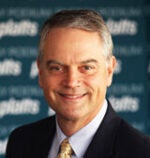- Co-host, Columbia Energy Exchange
Biography
Bill Loveless is a veteran energy journalist with a strong reputation for compelling interviews with leading newsmakers in print, on the air and in public forums. Bill co-hosts the Columbia Energy Exchange, a weekly podcast series at Columbia University’s Center on Global Energy Policy, and is a contributor to USA Today. He is also the director of the Columbia Energy Journalism Initiative, a program that acquaints up-and-coming energy journalists with finance, markets, policy, science and other disciplines associated with energy. Previously, Bill spent most of his career at McGraw Hill, including stints as an editorial director for Platts, the company’s energy news and information division, and anchor of the weekly TV program Platts Energy Week, which aired on the CBS affiliate in Washington and on PBS stations across the U.S. A 1973 graduate of URI, he earned a bachelor of arts degree in journalism and served as executive editor of The Good 5 Cent Cigar. His first job was as a reporter at the Pawtucket Times. He is a recipient of the McGraw Hill Corporate Achievement Award and a member of the National Press Club.
Advice for Students
Despite the uncertainty facing the news industry today, I haven’t lost my enthusiasm for journalism, and still highly recommend it to students. I’m an optimist at heart, and believe the industry will gradually adapt to a new and better business model. In the meantime, there’s no better way to spend a career than taking a “front seat” on events, satisfying your intellectual curiosity and telling a good story. I still believe that starting your career in a general news operation – like the old-style newspaper or its descendants – makes a lot of sense. Learning under the supervision of a demanding editor and covering a variety of topics gives you the grounding you need to prosper throughout your career. And having spent most of my career in the trade and business press, I believe it provides this very satisfying challenge: Your audience typically knows more than you do about a topic, so you have to work that much harder to break new ground.

